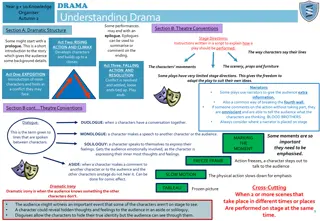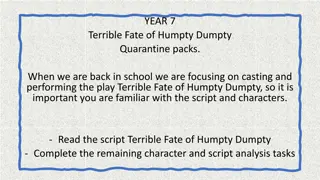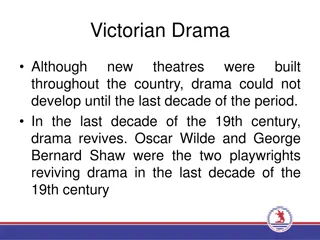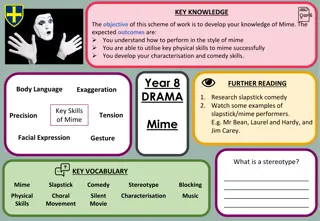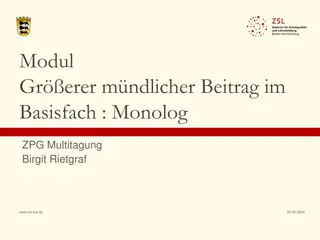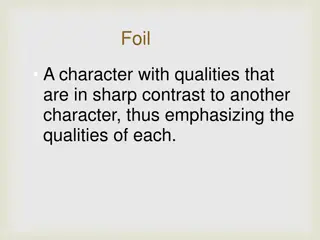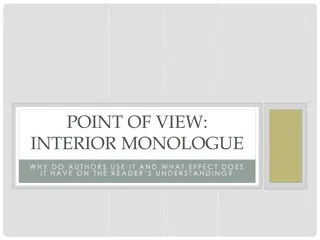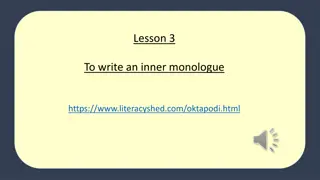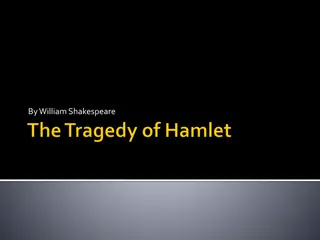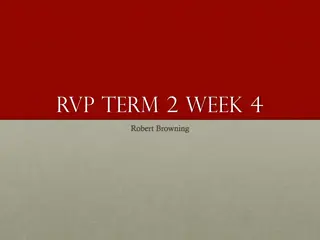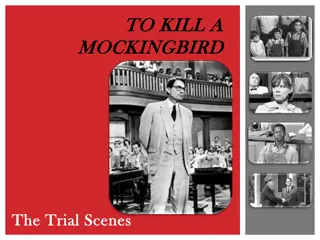Theater Conventions and Characterization in Drama
Theater conventions such as prologues, epilogues, dialogues, monologues, and dramatic structure like exposition, rising action, climax, falling action, and resolution are explored in drama. Additionally, the importance of character creation through techniques like backstories, flashbacks, and flashf
0 views • 4 slides
Understanding "Terrible Fate of Humpty Dumpty" Play Analysis
Delve into the script and characters of the play "Terrible Fate of Humpty Dumpty" to enhance your understanding of characterisation, monologues, and critical scenes within the story. Explore various themes such as bullying, empathy, and the complexities of school dynamics through a comprehensive ana
0 views • 35 slides
Revival of Drama and Poetry in Victorian Era
Drama in the Victorian era saw a revival in the last decade of the 19th century with playwrights like Oscar Wilde and George Bernard Shaw. Alongside, Victorian poetry explored themes of love and time in various aspects, with poets like Lord Alfred Tennyson experimenting with narrative poems and dram
1 views • 6 slides
Drama Scheme Development Overview
This drama scheme aims to enhance knowledge in Mime, Devising Theatre, and John Godber's style practically. Students will improve performance skills, characterisation, and comedy abilities through studying slapstick comedy, body language, devising techniques, and monologues/duologues. Key vocabulary
0 views • 5 slides
Understanding Drama Form and Genre
Exploring the nuances of drama, this content delves into the intricate relationship between form and genre. Offering insights into the varied types of forms in drama such as scripted plays, physical theatre, mime, monologues, movement/dance dramas, musicals, and pantomimes, it emphasizes the flexibi
0 views • 17 slides
Enhancing Monologic Speaking Skills in Education
Explore how to develop students' monologic speaking abilities through structured monologues, utilizing educational examples like the "Picture of the Week" ritual. The content covers competencies in societal and political discourse, strategies for presenting complex topics, and enhancing photographic
0 views • 19 slides
Explore Literary Devices in Drama
Delve into the world of drama with an examination of various literary devices such as foils, foreshadowing, similes, metaphors, conflicts, protagonists, antagonists, soliloquies, monologues, asides, irony, dramatic irony, blank verse, iambic pentameter, alliteration, and puns.
0 views • 13 slides
Understanding the Use of Interior Monologue in Literature
Authors utilize internal monologues to provide insights into characters' thoughts, emotions, and reactions. By exploring examples from works like "The Shining" and "Discovery," readers can grasp how interior monologues enhance storytelling by revealing inner conflicts and character development.
0 views • 7 slides
Inner Monologues in a Mysterious Adventure
Dive into the world of inner monologues as we follow a curious octopus on a thrilling journey filled with uncertainty and intrigue. Join the protagonist as they navigate through unexpected encounters and discover what lies beyond the ordinary. Explore the depths of introspection as the octopus refle
0 views • 6 slides
Shakespearean Dramatic Techniques Analysis
Explore the intricate use of monologues, soliloquies, structural divisions, and emotional responses in William Shakespeare's plays. Delve into the dialogues between characters like Hamlet, Gertrude, and Claudius to uncover themes of love, madness, and expectation. Discover how Shakespeare utilizes d
0 views • 23 slides
Analysis of Robert Browning's Dramatic Monologues and Implied Audience
In this content, we delve into the elements found in the dramatic monologues of Robert Browning, focusing on implied addressees, ideal recipients, and the implications of the dramatic form on the relationship between speaker, addressee, and reader. We explore how the presence of an implied audience
0 views • 5 slides
Perspectives on the Trial of "To Kill a Mockingbird
Explore the trial scenes and monologues from the iconic book "To Kill a Mockingbird" by Harper Lee. Dive deep into characters' perspectives, including Atticus Finch's closing speech, and create a unique monologue reflecting the experience of one character. Use Google Street View to envision the cour
0 views • 7 slides
